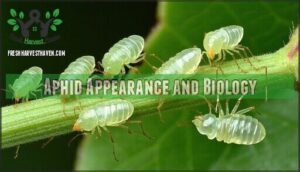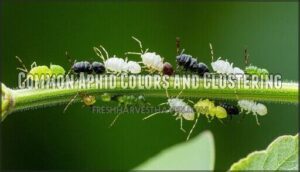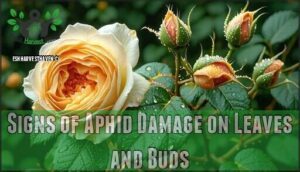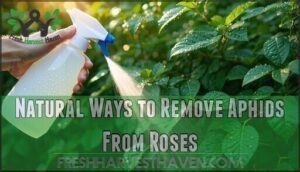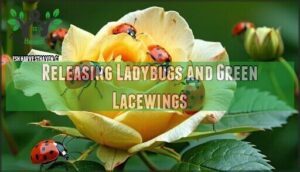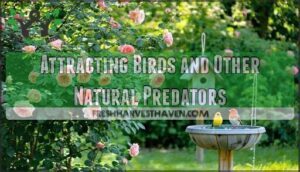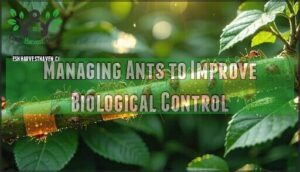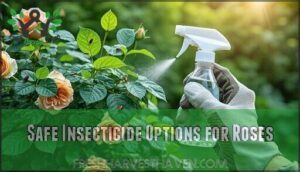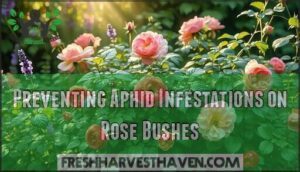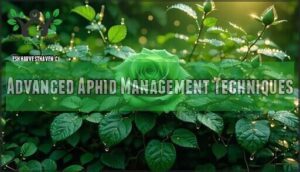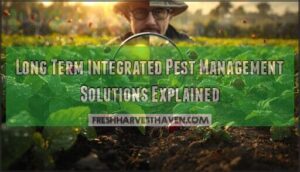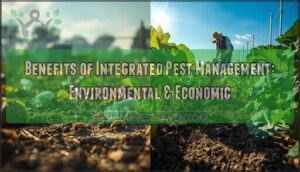This site is supported by our readers. We may earn a commission, at no cost to you, if you purchase through links.
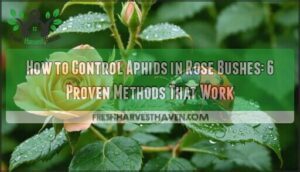
If they keep coming back, mix up some soapy water or grab a bottle of neem oil and spray every week or two until they’re gone.
Want something gentler? Try bringing in ladybugs and other helpful insects—they’ll happily munch on those aphids for you.
If things get really bad, you might need to step up to horticultural oils or other registered treatments.
Check your roses weekly during the growing season and plant companion flowers like marigolds to deter future invasions. The key is catching these soft-bodied bugs early before they multiply rapidly and damage your blooms.
Table Of Contents
- Key Takeaways
- How to Identify Aphids on Rose Bushes
- Natural Ways to Remove Aphids From Roses
- Using Beneficial Insects for Aphid Control
- Safe Insecticide Options for Roses
- Preventing Aphid Infestations on Rose Bushes
- Advanced Aphid Management Techniques
- Frequently Asked Questions (FAQs)
- How to get rid of aphids on rose plants?
- How do aphids affect rose bushes?
- Do Roses attract aphids?
- Does dusting a rose bushes kill aphids?
- What kills aphids on rose bushes?
- Does Dawn dish soap kill aphids on roses?
- What is the fastest way to get rid of aphids?
- Does vinegar kill aphids on plants?
- What is the best way to get rid of aphids on roses?
- Will soapy water hurt rose bushes?
- Conclusion
Key Takeaways
- Use water sprays first to knock aphids off your roses – it’s the quickest and gentlest method that won’t harm your plants or beneficial insects
- Apply natural treatments like soapy water or neem oil every 7-14 days to kill remaining aphids without using harsh chemicals
- Release beneficial insects like ladybugs and lacewings to eat aphids naturally – they’ll consume hundreds of pests daily and provide ongoing protection
- Check your roses weekly during the growing season and plant companion flowers like marigolds to catch infestations early and prevent future problems
How to Identify Aphids on Rose Bushes
You’ll spot aphids as tiny, oval-shaped bugs that cluster on rose buds, new shoots, and leaf undersides in colors ranging from green to black.
Look for telltale signs like sticky honeydew residue, curled leaves, and ants crawling on your plants, which indicate these sap-sucking pests have moved in.
Aphid Appearance and Biology
When spotting these tiny garden troublemakers, you’re looking at oval-shaped insects measuring just 1/16 to 1/4 inch long. Understanding aphid morphology helps with identification: soft bodies, long antennae, and two small tubes called cornicles on their rear end.
Rose aphids start their lifecycle as eggs that overwinter and hatch in early spring. Most wingless aphids crawl from plant to plant, though some develop wings for longer journeys. Their aphid biology centers on rapid reproduction—females can produce dozens of offspring without mating.
Common Aphid Colors and Clustering
You’ll spot aphids in various colors, including green, white, black, red, and brown, on your roses. These tiny pests cluster together on buds and new shoots, making identification easier.
Different aphid species show seasonal changes in coloration, with some developing darker hues as temperatures drop. Their clustering behavior creates dense populations that can overwhelm rose bushes quickly if left unchecked.
Signs of Aphid Damage on Leaves and Buds
Damage from aphid infestations becomes obvious once you know what to look for. Leaf curl is evident as rose leaves twist and wrinkle abnormally. Discoloration appears as yellowing or browning patches on affected foliage.
Rose buds exhibit bud deformity, appearing misshapen or failing to open properly. Stunted growth impacts new shoots and developing leaves.
These infestations produce honeydew, creating sticky surfaces that attract other problems. Early detection is crucial for preventing widespread aphid damage.
Sooty Mold, Honeydew, and Ant Activity
Honeydew Effects become visible as sticky, shiny droplets coating your rose leaves and stems. This sugary secretion from feeding aphids creates perfect conditions for Sooty Mold growth, appearing as black patches that block sunlight.
You’ll spot Ant-Aphid Symbiosis when ants farm aphids for honeydew, protecting them from predators.
This Indirect Damage weakens roses considerably through reduced photosynthesis and compromised plant health.
Natural Ways to Remove Aphids From Roses
Dealing with aphids on your roses? Simple, natural methods work wonders without harming your plants or the environment.
These organic approaches include water sprays, soap solutions, and neem oil treatments that effectively eliminate aphids without toxic chemicals.
Water Spray Techniques for Dislodging Aphids
Why struggle with aphids when water can knock them off your roses? Use moderate spray pressure to dislodge aphids without damaging delicate petals or leaves. Cool water temperature works best for plant safety.
Select adjustable nozzle types for targeted coverage. Spray frequency should be every 2-3 days until aphid populations drop.
This gentle aphid control method protects your roses while effectively removing pests from stems and buds naturally.
DIY Soap Sprays and Application Tips
Soap sprays pack a one-two punch against aphids on roses. Mix mild liquid dish soap with water—one tablespoon per quart works perfectly. Castile soap and insecticidal soaps are your best bets for avoiding phytotoxicity.
Apply every three days during active infestations, coating leaf undersides where aphids hide. Spray early morning or evening to prevent leaf burn. This gentle aphid control method suffocates pests without harsh chemicals.
Neem Oil for Organic Aphid Control
Neem oil stands out among organic pest control methods for roses. This natural extract disrupts aphid feeding and reproduction while remaining safe around beneficial insects when applied correctly.
Here’s your neem oil game plan:
- Mix properly – Combine 2 tablespoons neem oil with 1 gallon water and a few drops of mild soap
- Time it right – Apply during early morning or evening to avoid leaf burn
- Cover thoroughly – Spray leaf undersides where aphids hide most
Apply every 7-14 days until aphids disappear. You’ll see results within days as aphids stop feeding and eventually die off.
Using Beneficial Insects for Aphid Control
Bring in nature’s cleanup crew to handle those aphids without reaching for chemical sprays.
Ladybugs, green lacewings, and birds will eat aphids on your roses, providing effective biological control that won’t harm your plants or beneficial pollinators.
Releasing Ladybugs and Green Lacewings
Releasing aphid predators like ladybugs and lacewings provides excellent biological control for rose bushes. Commercial ladybug release rates require 150 beetles per plant for effective results. Green lacewing larvae consume 100 aphids daily, making them powerful natural enemies. Proper habitat enhancement with shelter and water sources improves predation efficacy factors when combining predators for greatest beneficial insect impact.
| Predator Type | Release Rate | Daily Consumption |
|---|---|---|
| Ladybugs | 150 per plant | 50-60 aphids |
| Green Lacewings | 5-10 larvae | 100 aphids |
| Convergent Lady Beetles | 150 minimum | 40-50 aphids |
| Hoverfly Larvae | Natural attraction | 30-40 aphids |
| Combined Release | Follow ratios | Up to 200 aphids |
Attracting Birds and Other Natural Predators
Bird-Friendly Gardens transform your rose area into a natural pest control hub. Finches and sparrows devour hundreds of aphids daily when you provide water sources, native plants, and predator shelters.
Install bird feeders near affected roses to attract these natural enemies. Create lacewing habitats with diverse flowering plants that foster beneficial insects year-round.
Songbirds need nesting boxes and consistent water to establish territories around your roses, making them reliable aphid predators.
Managing Ants to Improve Biological Control
Ants protect aphids from predators, reducing predation efficacy by up to 60%. You need ant exclusion methods to boost biological control success. Apply sticky barriers around rose stems and use ant baits strategically. Focus on habitat modification and honeydew reduction to break the ant-aphid partnership.
- Apply sticky barriers or tape around rose stems to prevent ant access
- Place ant baits 3-6 feet away from rose bushes to redirect colonies
- Remove weeds and debris where ants nest near your roses
- Spray water on stems to wash away honeydew that attracts ants
- Create physical barriers using diatomaceous earth around plant bases
Safe Insecticide Options for Roses
If gentle approaches don’t do the trick, targeted insecticides offer a reliable backup plan for stubborn aphid problems.
Choose products with ingredients like neem extract, horticultural oil, or potassium salts of fatty acids for effective control with minimal impact on beneficial insects.
Choosing Registered Insecticides for Aphids
When beneficial insects aren’t enough, insecticides offer reliable backup. Look for EPA-registered products listing roses on the label.
Neonicotinoids like imidacloprid provide systemic protection, while pyrethroids offer quick contact kills. Check active ingredients carefully—some aphids show resistance to certain chemicals.
Rotate insecticide classes to prevent resistance buildup. Always verify the product targets aphids specifically before application.
Application Timing and Dosage Guidelines
Once you’ve selected the right insecticide, timing becomes your secret weapon. Apply treatments at the first sign of crawler emergence when aphids are most vulnerable.
Follow the pesticide label’s dosage calculation precisely—more isn’t better and can harm your roses. Weather considerations matter: avoid windy days and temperatures above 85°F.
Plan re-application intervals based on the product’s residual activity, usually 7-14 days. Rotate different active ingredients for effective resistance management.
Protecting Pollinators and Beneficial Insects
Smart gardeners know that protecting pollinators while controlling aphids requires strategic thinking. Choose targeted treatments that spare beneficial insects while eliminating pests effectively. Here’s your action plan:
- Apply insecticides during evening hours when bees are inactive
- Select systemic products that don’t affect flower-visiting insects
- Create pollinator habitats away from treated roses
- Use insecticide alternatives like beneficial insect releases
- Maintain ecological balance through IPM compatibility practices
This approach keeps aphid predators working while attracting beneficial insects naturally.
Preventing Aphid Infestations on Rose Bushes
Weekly rose inspections and consistent care help catch aphids early, before they establish colonies on your plants.
Smart garden practices like companion planting and avoiding over-fertilization create conditions that naturally discourage these pests from settling on your bushes.
Regular Inspections and Early Detection
Prevention starts with catching problems before they spiral out of control. Check your roses weekly during the growing season, focusing on new growth where aphids love to gather. Look closely at leaf undersides and flower buds during your routine plant checkups.
| When to Check | What to Look For | Action Required |
|---|---|---|
| Early spring | Overwintered eggs on stems | Remove affected shoots |
| Weekly growing season | Green/black clusters on buds | Begin treatment immediately |
| After rain/watering | Sticky honeydew on leaves | Assess infestation severity |
| Late summer | Winged aphids arriving | Increase monitoring frequency |
| Before winter | Egg-laying activity | Apply dormant oil treatment |
Your seasonal inspection timing matters most in spring when aphid populations explode.
Companion Planting to Deter Aphids
Strategic companion planting creates a natural barrier against aphids through scent confusion and trap cropping methods.
Plant these repellent varieties around your rose bushes:
- Alliums (garlic, chives, onions) – their sulfur compounds mask rose scents
- Marigold varieties – release compounds that deter aphids naturally
- Catnip and herbs – provide strong aromatic protection
- Trap crops (mustard, nasturtium) – lure aphids away from roses
This repellent plant list offers proven aphid prevention techniques.
Garden Maintenance and Fertilization Practices
Healthy rose bushes naturally resist aphids better than stressed plants. Maintain proper soil health through regular testing and amendments. Water deeply but infrequently to encourage strong root systems.
Avoid over-fertilizing with nitrogen, which produces tender growth that attracts aphids. Choose disease-resistant rose varieties when planting. Prune dead or damaged wood to improve air circulation.
These cultural practices strengthen your roses’ natural defenses against pest infestations.
Advanced Aphid Management Techniques
Sometimes the usual tricks just don’t cut it against stubborn aphid infestations. That’s when you need to bring out the heavy-duty tactics that actually work on persistent colonies.
What works best? Methods backed by real research and proven in actual gardens. You’ll get lasting control on your rose bushes when you combine the science with hands-on know-how.
Integrated Pest Management Strategies
Beyond basic spraying and releasing ladybugs, successful Integrated Pest Management combines multiple strategies for lasting aphid control on rose bushes. IPM timing matters—monitor weekly and act when aphid counts exceed ten per bud. You can also use non-toxic soap sprays to manage aphid populations.
- Economic Thresholds: Track aphid populations to determine when intervention becomes cost-effective
- Predator Habitats: Create flower strips and banking plants to foster beneficial insects year-round
- Ant Management: Use barriers or baits since ants protect aphids from natural predators
- Resistance Management: Rotate control methods to prevent aphids from adapting to treatments
Dormant Season Oil Treatments
Most gardeners overlook this winter weapon against aphids. Dormant season oil treatments deliver an average 85% aphid reduction on rose stems and buds. Apply horticultural oils between late fall and early spring when roses are leafless. Oil type selection matters—choose refined petroleum or plant-based oils designed for dormant applications. Consider rose cultivar sensitivity and environmental considerations like temperature ranges. Proper oil application timing ensures long-term efficacy without damaging emerging growth.
| Treatment Aspect | Key Details |
|---|---|
| Best Timing | Late fall through early spring, before bud break |
| Temperature Range | Apply when temps are 40-70°F for 24 hours |
| Oil Concentration | 2-4% solution for dormant season applications |
| Coverage Method | Thorough spray of all canes, joints, and soil surface |
| Reapplication | Once per dormant season, repeat if heavy infestation |
Monitoring for Re-Infestation and Adjusting Methods
Effective aphid control methods require ongoing vigilance to catch re-infestation signs early. Check your roses weekly during the growing season, adjusting treatment efficacy based on what you observe.
- Monitor for new aphid colonies on fresh growth and buds
- Track seasonal adjustments needed as temperatures change
- Rotate control methods to prevent resistance management issues
- Document long-term prevention strategies that work best for your garden
Frequently Asked Questions (FAQs)
How to get rid of aphids on rose plants?
Spray aphids off your roses with a strong water stream, then apply soapy water or neem oil to kill remaining pests. Introduce ladybugs for natural control.
How do aphids affect rose bushes?
Aphids drain your rose bushes by piercing stems and leaves to suck out essential sap, weakening plants and making them vulnerable to disease and other pests.
Do Roses attract aphids?
While roses don’t actively attract aphids, their tender new growth and sweet sap make them irresistible targets.
You’ll find these pests drawn to your healthiest, most vigorous rose shoots every spring.
Does dusting a rose bushes kill aphids?
Dusting with flour can kill aphids, but it’s hit-or-miss. The flour clogs their digestive system or causes them to dehydrate. This is because flour impacts their honeydew excretion process.
Chemical dust insecticides are more reliable for consistent control.
What kills aphids on rose bushes?
You’ll find several effective killers work against these pesky insects. Water sprays dislodge them, while soapy water solutions and neem oil smother them completely. Ladybugs and lacewings devour them naturally.
Does Dawn dish soap kill aphids on roses?
Yes, Dawn dish soap mixed with water creates an effective aphid killer. Mix one to two teaspoons per quart of water, then spray directly on infested areas. The soap suffocates aphids by breaking down their protective coating.
What is the fastest way to get rid of aphids?
Like a warrior wielding swift arrows against invading forces, you’ll want to blast those green invaders off with a strong water spray first.
Follow up immediately with soapy water or neem oil for ultimate knockout power.
Does vinegar kill aphids on plants?
Vinegar can kill aphids on contact, but you’ll risk damaging your plants. A 50/50 vinegar-water solution kills aphids but may also harm or kill plants, so safer alternatives work better.
What is the best way to get rid of aphids on roses?
Spray aphids off your roses with a strong water stream, then apply insecticidal soap or neem oil. Release ladybugs for natural control. Check plants weekly and remove infested shoots promptly.
Will soapy water hurt rose bushes?
Back in your grandmother’s day, folks swore by soapy water for garden troubles.
Mild liquid soap mixed with water won’t harm your roses when used properly. Use gentle dish soap, not harsh detergents, and rinse afterward to prevent buildup.
Conclusion
Congratulations, you’ve now mastered the art of aphid warfare—because nothing says "gardening expert" quite like declaring victory over insects smaller than your pinky nail.
Nothing says gardening expert quite like declaring victory over insects smaller than your pinky nail
Successfully learning how to control aphids in rose bushes means you’re equipped with water sprays, beneficial insects, and organic treatments that actually work. Check your roses weekly, act fast when you spot these green invaders, and remember that prevention beats treatment every time.
Your roses will reward your vigilance with healthier blooms and fewer pest problems.
- https://ipm.ucanr.edu/home-and-landscape/roses-insects-and-mites/pest-notes/
- https://hgic.clemson.edu/factsheet/rose-insects-related-pests/
- https://www.extension.msstate.edu/publications/publications/insect-pests-roses
- https://extension.msstate.edu/publications/insect-pests-roses
- https://pmc.ncbi.nlm.nih.gov/articles/PMC10910744/

